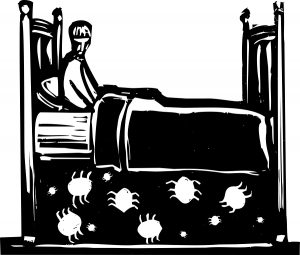 Bed bugs can cause some of health risks which include skin welts and swelling, allergic reactions, and psychological effects. They can be infected by notably 28 human viruses, but not a single study has found evidence that the bug is capable to transmit the viruses to a human being.
Bed bugs can cause some of health risks which include skin welts and swelling, allergic reactions, and psychological effects. They can be infected by notably 28 human viruses, but not a single study has found evidence that the bug is capable to transmit the viruses to a human being.
Bed bug bites, also known as cimicosis, may cause a variety of skin hazards from no noticeable effects to evident swelling. Analysis includes both discovering bed bugs and the episode of comparable manifetations. Treatment covers the eradication of the pest but is contrarily indicative.
Bed bugs have been known to bear methicillin-resistant staphylococcus aureus (MRSA), a treatment resistant species of the staph virus. Bed bugs have also been identified with vancomycin-resistant enterococcus faecium (VRE), but the implication of this is still indefinite.
Studies on the public health risks of bed bugs have been surprisingly insufficient over the past many decades, mainly due to the notable deterioration in bed bug populace in the late 20th century. Now that the number of bed bug is quickly resurging, supplementary research is necessary to find out the causes for the resurgence, and the possibility for bed bugs to transmit pathogens which can have dreadful consequence on public health.
Bed bugs are generally blood-sucking insects. They feed on the blood of humans and even animals. Therefore, it is palpable for the bed bugs to persistently attack their hosts. These insects are detected in large numbers along with the humans. Their existence can be perceived in homes as well as in other places.
This article aims to review the adverse health effects that bed bugs can make. A white inflamed bulge can be seen on the skin in the part where the bed bug has bitten. To prevent others getting infested by bed bugs, this is to be taken as discretion to eliminate the bed bugs from the residence. It is signified to get rid of the infestation, as bed bugs bite causes several health harmful effects.
The initial effect caused by the bed bug bite is skin rashes and welts. When the bed bug sips blood from the host, a particular liquid is released which leads to skin rashes. The potential effects of the bite can at times invisible and sometimes can be developed as welts, which upsets the appearance of the skin.
Specific reactions to bites differ, varying from no evident effect to tiny reddish spots, to noticeable blisters and abscess formations accompanied with severe itching that may last for a few days. The bites usually appear in a line. A focal hemorrhagic mark may also develop due to the discharge of anticoagulants in the saliva. Signs may not emerge until a few days after the bites. Responses usually become more fast-moving after several bites due to potential stimulation to the salivary proteins present in bed bugs. Skin reaction typically appears in the area of the bed bug bite which is most frequently the arms, legs, shoulders and other parts that are more commonly exposed at night.
Some skin allergies are triggered by the bite of bed bugs. If these allergies are not treated, they can spread on the skin resulting to further infliction. Aside from the physical effects, bed bug bites also have psychological effects to the body. These psychological impacts hamper us from doing our regular activities effectively.
These bed bugs exist in crevices and other dirty parts of the house. Female bed bugs lay their eggs regularly. They also shed skin regularly. This makes the place filthy. The bed bugs have a characteristic of discharging a horrible musty stench. This smell can affect the odor of the room.
Psychological
Severe infestations and persistent attacks can lead to anxiety, insomnia, and stress. Growth of unyielding neurotic parasitosis is probable, as a person builds up a devastating phobia with bed bugs.
Other
Several other symptoms may arise from either the infestation or the bite of the bed bugs. Anaphylaxis caused by the infusion of antibody and other obscure proteins has been barely documented. Chronic or serious infestation may lead to anemia due to each bite sucking a small amount of blood. Pathogenic skin infection may happen due to skin breakouts resulting from habitual scratching. Intrinsic poisoning may transpire if the bites are frequent. Getting in contact with bed bugs may provoke an asthma attack due to the impacts of airborne irritants though indication of this relation is insufficient. There is no proof that bed bugs spread infectious diseases even if they seem physically able of carrying viruses and this likelihood has been thoroughly examined. The bite may be agonizing hence ensues insomnia and poor work performance.
A reliable analysis of health effects due to bed bugs necessitates tracking and discovery of the insect in the affected environment. Other probable circumstances with which these conditions can be mixed up involve scabies, mosquito bites, allergic reactions, spider bites, bacterial skin infections and chicken pox. Bed bugs naturally make a line of bites commonly termed as “breakfast, lunch, and dinner” and seldom feed on the armpit or at the back of the knee which may help distinguish it from other biting pests. If there is a large population of bed bugs, an overpowering sweet smell may be sensed.
Scabies is another small parasite that clings in your skin. It can be acquired from getting in contact with someone who bears it. It can also be obtained and transmitted from a hospital setting, or from hotel bed sheets. Scabies bite causes an intensely itchy breakout that looks similar to bedbug bites, so the two are commonly confused.
Study confirms that it is likely for a bed bug to become immunized with a disease. It means that if it bites someone with hepatitis B, then it can substantially bear hepatitis B. On the contrary, they do not appear to be able to transmit hepatitis B on to another individual they bite. There are quite a lot of speculations as to why this is possible. One assumption holds that a pathogen cannot reproduce itself inside a bed bug, another claims that the viral mass is not adequate enough to cause a risk to other people. Some individuals dispute that it is due to the fact that blood is not transmitted by the bed bugs from previous bites into their recent hosts.
Allergic Reaction
The Michigan Department of Community Health explains that the bodily symptoms of bed bug bites can differ broadly. You may not even perceive bed bug bites at all. If in some cases you do experience bites, you may just think of them as mosquito bites because the central redness and inflammation may look similar as that the mosquito makes. On the other hand, if you’re receptive to insect bites of any type, you may encounter an allergic reaction to bed bug bites. The reaction can be minor, causing only itching, skin rash and irritation. More serious allergic reactions are likely and may demand treatment with the application of anti-itch ointments or antihistamines and oral corticosteroids.
Infection
Bedbug bites by itself do not cause infection. But if you cannot resist from scratching the bites, it may result to infection. Scratching bed bug bites can lead to wounds or breakouts in the skin. Pathogens can penetrate through these breaks and start to multiply, resulting to infection. Your doctor may prescribe ointments to apply on the bitten area to stop infection from occurring or may recommend you to use retailed antibacterial ointments instead.
Respiratory Issues
The existence of bed bugs can worsen respiratory problems. So if you or a member of your household has respiratory issues, you need to make sure the absence of bed bugs in your home. Bed bugs cast off their superficial skins, or shell, as they mature. These shed skins, together with the bed bugs’ excrement, become airborne when they dry out. The Rhode Island Department of Health advises that inhalation of shed matter from bed bugs can instigate asthma and other respiratory conditions.
Anemia
A medical record issued in the Canadian Medical Association Journal in 2009 depicts the experience of a 60-year-old man who manifested to his doctor with signs of iron-deficiency anemia. The man exhibits no physical causes of this illness, however upon inspection of his home; the doctor discovered an infestation of bed bugs by thousands. Even though most people bitten by bed bugs are rarely to experience anemia as an outcome, it could happen in severe cases, particularly if you suffer from other hazard factors for anemia.
For this reason, having awareness on the ill effects induced by bed bugs, it is required to take precautionary measures to get rid of bed bugs. The next big question now is ‘how to get rid of bed bugs?’. If you think you alone can’t handle the infestation, don’t fret. There are available professional pest control companies that you can hire which could help you in controlling bed bugs with the use of powerful pesticides. This is advisable if the degree of bed bug infestation is high.


